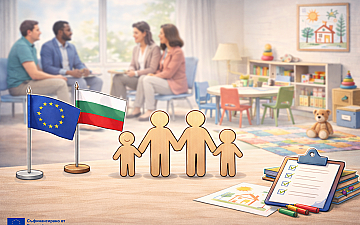The article by Prof. Daniela Ilieva has been published in the journal:
"Pre-school & School Education: management - education - training”, in the section "The modern teacher is in class.” The rubric aims to present modern, different, and innovative approaches to communication; models of knowledge about human relations and development; and quick and effective techniques for overcoming generational and other differences.
The teaching profession is no longer limited to being a teacher of a subject or discipline but also a mentor, facilitator, role model, and coach in the lives and maturation process of young people. The role of the teacher is no longer only to teach thematic lessons but also to teach all important life lessons necessary for successful development, career orientation, and the complex construction of the individual's value system.
If we had a better understanding of how people's values were formed, we could navigate this process more effectively. And as people who work with children and young people, we inevitably become companions on the journey of forming their value system.
Knowledge of the principles on which the value system operates is a useful and powerful tool, but, of course, is used with particular care.
Some of the terminology used in this article is explained below:
Values are what is most important to us. According to the Wordbook - English Dictionary, values are the personal beliefs of a person or social group in which they have an emotional investment (in defense of or against something).1 The Business Dictionary defines values as important and enduring beliefs or ideals shared by members of a culture about what is good or bad, desirable or undesirable. The Oxford Dictionary defines values as the attitude of being worth something and; the importance, worth, or usefulness of something.
Values are not what we like but what is important to us; they are not what we want, but what we aspire to.
Beliefs are the internal attitudes that something is true. Behavior is determined by our beliefs. Deep beliefs are fundamental attitudes about what is most important to us. Metaprograms are the mental processes that govern, navigate and direct other mental processes.
The value system and metaprograms largely define personality. Values are important because they motivate us to do what we do. Values are also defined as habits: people value different things because they think of using different habits. Habits because our way of thinking becomes a pattern of habits, and this is why we obtain the same results when we apply the same pattern of behavior - the sum of our habits.
Since we all think differently, it is extremely important to learn to communicate differently with different people, and in our case, with different students.
In the 21st century, children no longer seem to be children but at times older and more experienced than adults. As much as we – the teachers can teach them, twice as much we ourselves can learn from them. It takes an adaptation initiated by us. From a position of wisdom and maturity, we can and should take responsibility for being modern, interesting, continuous learners, not stigmatizing generational differences and "today's youth." Knowing and studying someone's patterns of behavior allows us to speak their language. This is where the great challenge for the modern teacher comes in, because holding interest for more than 8 minutes is a real ordeal, and communicating systematically and bilaterally with today's student is something bordering on science fiction. Current student jargon is like a living entity and changes if not every day, then certainly every week.
As mentioned earlier in this article, knowledge of the formation process and the principles of the value system is a useful tool in the communication process and in the awareness of the stages that students go through, in addition to the stages of the class system.
The use of role models is a subconscious human behavior that starts from birth. According to sociologist Maurice Messi, there are three periods of value development, and if we think about what happened to us during these periods, who we modeled, what our environment was like - school, our circle of friends, the groups we belonged to, significant emotional events, we will realize how much all of this has influenced the formation of certain habits and our value system.
The Imprint Period - The imprint period - 0 to 7 years
From birth to the age of seven, we are like sponges soaking up everything around us, taking much as truth, especially when "soaked up" by parents. Confusion and misguided blinding beliefs from this period can lead to psychological trauma and other deep problems. A critical element of this period is to acquire the correct sense of right and wrong, good, and bad. About 20 billion synaptic connections are formed in the brain during this period.
The Modeling Period - The modeling period - from 8 to 13 years
Between the ages of 8 and 13, we copy the people around us, primarily parents, but also other objects from which we borrow and "learn" patterns. Despite the tender age, imitating models is not blind, but is more like trying on a garment to see how it feels to wear. This age is typical of being heavily influenced by religion, by teachers, coaches - by individuals who seem competent, and to a greater extent than our parents.
The Socialization Period - The period of socialization - from 14 to 21 years
| Age | Period | Characteristics |
| 0-7 years | Imprint | We absorb everything like a sponge; about 20 billion new synaptic connections are created |
| 8-13 years | Modeling | We are pretty much what we modeled around the age of 10 |
| 14-21 years | Socialization | We choose a role model and "test" it in front of others |
| 22-35 years | Career | During this period, we model who associate with in the business arena |
Table 1. Periods of formation of the value system
Source: Author’s image
From the ages of 14 to 21, we are mainly influenced by our peers. In the process of personality development and in the search for ways to get out of the incipient programming (the imprint period), we naturally seek socialization with people who are like us. Other sources of influence typical of age are the media, especially those that resonate with our values and those of our surroundings.
As the very periods identified by Maurice Messi prove, values come from the family - for example, how parents express feelings and emotions, how honest they have been with us, and how much time they have spent with us. The role of family is most significant during the imprint period. Friends also influence the formation of values - how honest and loyal they are–and how they show their friendship in general. The school environment has a significant influence on value formation - how strict or lenient the environment is, whether the school is private or public, how hierarchical the school is, how accessible the teachers are, etc. What this environment has taught us in terms of success, money, guilt, responsibility, honor, social responsibility, and much more. Significant political events also influence the formation of the value system. Geographic location also determines our values, the television programs and shows that we watched while growing up, and the major media channels.
The latter period is the most important for the development of the personality and it is during this period that high school students are in the school environment where they spend most of their time. The time they spend with parents is much less, their friendship circle is most often formed by or through the school social environment.
In a study conducted in 2017, our research team found that the age at which a person is ready to self-reflect and make largely objective judgments and evaluations of themselves is after the age of 15. The value system "completes" its development at age 21. Therefore, the age that is crucial for important choices in a young person's life - future development, continuing education, career orientation, choice of social environment - is between the ages of 15 and 21. And we, educators, teachers, role models, mentors, and supporters, are there to play our meaningful role and leave our valuable mark.
The understanding of the peculiarities of the value system of the generations, the adaptation of the teacher, the desire to learn continuously, the awareness of responsibility are part of the prerequisites for the successful preparation of young people for the new environment awaiting them, no matter what path of personal and career development they will choose.
[1] Wordbook - English Dictionary, accessed 2018.
Source: http://www.businessdictionary.com, accessed 2018.
[3] Source: https://en.oxforddictionaries.com/definition/value, accessed 2019.









